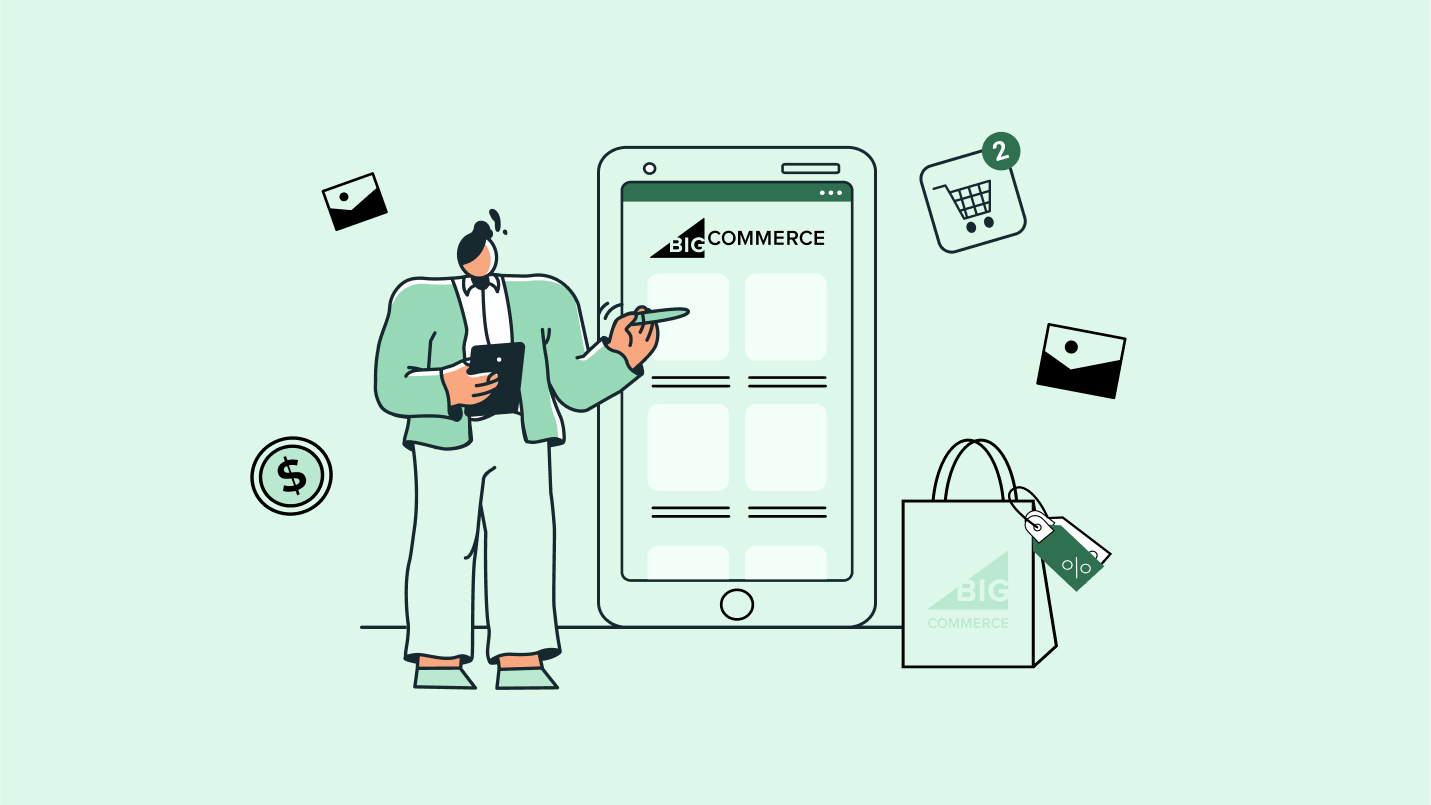BigCommerce has four pricing plans, Standard, Plus, Pro, and Enterprise. BigCommerce pricing is transparent, with no hidden costs, fees, or bandwidth overages. The following table will give you a high level overview of the pricing and features of each plan. For details on more features and credit card rates, read our detailed plan comparison that follows.
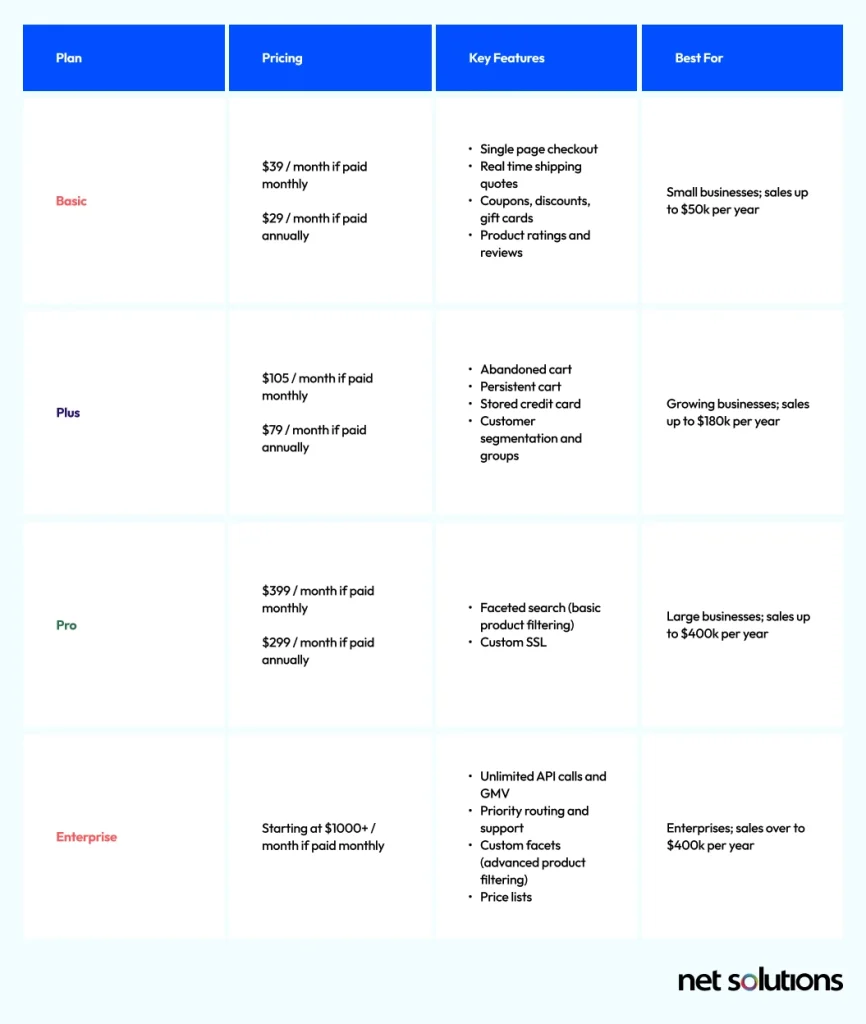
Please note, BigCommerce B2B Edition is not included by default, but is an additional add-on with custom pricing.
BigCommerce also offers a no-risk 15-day free trial to help you decide if the platform is right for you and to get a general sense of what pricing tier you may fall in. If you are still looking at platforms, we invite you to look at the top enterprise eCommerce platforms to better compare prices across platforms and to learn more about what it means to go headless with BigCommerce.
What is BigCommerce?
BigCommerce is a hosted headless eCommerce platform that offers full enterprise capabilities over B2C (business-to-consumer), multi-storefront, and add-on B2B eCommerce (business-to-business) capabilities. With this flexibility, BigCommerce is ideal for small to large organizations that market via multiple storefronts, regions, segments, brands or channels, and who want advanced features in an easy-to-use platform.
Some key features of BigCommerce are:
- Supports multi-storefront and cross-channel capabilities allowing you to serve multiple regions, segments, brands or channels (e.g. marketplaces) from a single dashboard
- Simple tools such as the page builder visual editor, drag-and-drop merchandising, and integrated preview
- Leverages a proprietary content delivery network (CDN) for performance
- Real-time analytics and 11 standard report types
- Customizable checkout and payment processes, including a one-page checkout experience
- Mobile responsive designs, with the option to create a progressive web app or support custom front-ends for omnichannel support. Front-end frameworks supported include Next.js, Gatsby.js, and Nutx.js
- Native CMS capabilities to manage inventory and orders
- Basic promotional tools
While all of these features come native, the more features you want available, the higher you can expect your price tier to be. The logic of this is that basic stores only need basic features, but serving larger customer bases requires competing on a higher level, introducing features such as:
- Refined searching and filtering
- Persistent and abandoned cart tools
- Store credit card
- Customer segmentation
- Price lists
- B2B features (add-on product outside of price tiers)
Let’s examine each tier in detail to understand when you can expect these features to become available to you (based on sales volume).
Which Are The BigCommerce Pricing Plans?
There are four primary BigCommerce Plans, each with 24/7 support, mobile responsive default theme, unlimited staff accounts, support for Apple Pay, Google Pay and Amazon Pay, and zero transaction fees:
- Standard: $39 if paid monthly and $29 per month if paid annually
- Plus: $105 if paid monthly and $79 per month if paid annually
- Pro: $399 if paid monthly and $299 per month if paid annually
- Enterprise: $1000 if paid monthly and $12,000 per year, as a starting rate
Each price plan adds incremental features based on store size, better credit card rates, with transitions between plans based on sales volume (scaling plans is automatic). In the following, we’ll break down the prices for each plan and the features of each plan. All prices are in USD.
1. Standard Plan
The BigCommerce Standard plan starts from $39 per month, when on a monthly plan, or $29 per month, when on an annual plan, for a total of $348 per year.
The BigCommerce Standard plan includes the following features:
- One page checkout
- Free HTTPs dedicated SSL
- BigCommerce mobile app
- Real time shipping quotes
- Pricing extensions: coupons, discounts, gift cards
- Product ratings and reviews
- Extensive integration options (payment gateways, marketplace, social, POS, mobile, security and more)
- Credit card rates (PayPal powered by Braintree) of 2.59% + $0.49 per transaction
The Standard plan is suitable for entrepreneurs and small businesses with sales up to $50k per year and up to 3 storefronts.
2. Plus Plan
The BigCommerce Plus plan starts from $105 per month, when on a monthly plan, or $79 per month, when on an annual plan, for a total of $948 per year.
The BigCommerce Plus plan includes the following features:
- Customer segmentation and groups
- Abandoned cart
- Persistent cart across channels
- Stored credit card
- Credit card rates lowered to 2.35% + $0.49 per transaction
The Plus plan is suitable for growing businesses, with sales up to $180k annually and up to 5 storefronts.
3. Pro Plan
The BigCommerce Pro plan starts from $399 per month, when on a monthly plan, or $299 per month, when on an annual plan, for a total of $3588 per year.
The BigCommerce Pro plan includes the following features:
- Product filtering (faceted search)
- Custom SSL
- Credit card rates lowered to 2.05% + $0.49 per transaction
The Pro plan is suitable for businesses that have sales up to $400k annually and up to 8 storefronts.
4. Enterprise Plan
The BigCommerce Enterprise plan starts from $1000 per month, though the final price is by quote only.
The BigCommerce Enterprise plan includes the following features:
- Unlimited API calls
- Unrestricted gross merchandise value (GMV) limits
- Priority routing and support
- Custom facets (product filtering) and price lists
- Credit cards rates lowered to 2.05% + $0.49 or lower per transaction
The Plus plan is suitable for large enterprise clients who want more unrestricted capabilities.
Are There Other BigCommerce Fees?
BigCommerce fees refer to any costs you may incur outside of your eCommerce platform. While BigCommerce prides itself on fully-transparent platform fees, you can expect there to be additional costs to have an eCommerce storefront.
These additional costs associated with choosing BigCommerce can be due to the use of the B2B edition, purchase of website domain names, purchase of themes or custom designs, purchases or monthly costs associated with apps and integrations from the BigCommerce marketplace, or any add-on payment gateways, front-end setups, or POS solutions that you may add (although you don’t need to).
1. B2B Edition
BigCommerce B2B Edition is not included by default, but is an additional add-on with custom pricing. The B2B Edition adds core capabilities to manage front-end and back-end B2B processes including sales representative support, quoting, shared shopping lists, corporate account management and a self-serve invoice portal.
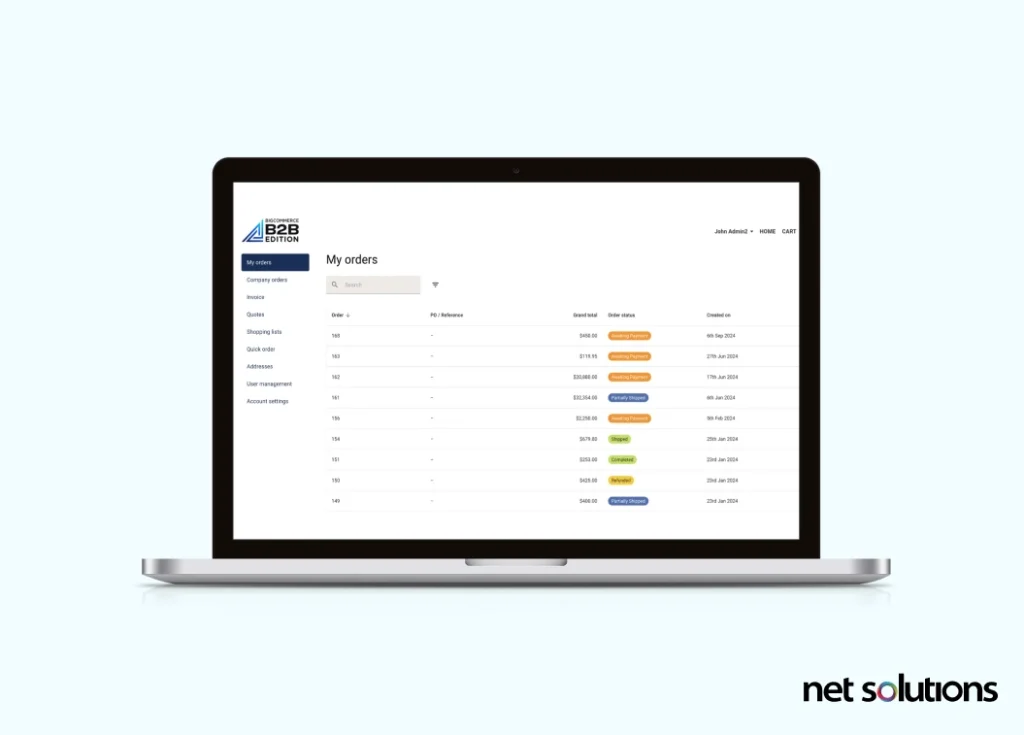
2. Domain Name
All websites will require a custom domain name, ranging from very low ($6 per year) to very high, depending on how unique or short it is and how well it aligns to your brand. In general, you can purchase domain names from a registrar such as Google Domain, but a previously held (or “squatted”) domain name may need to be purchased from an existing domain owner.
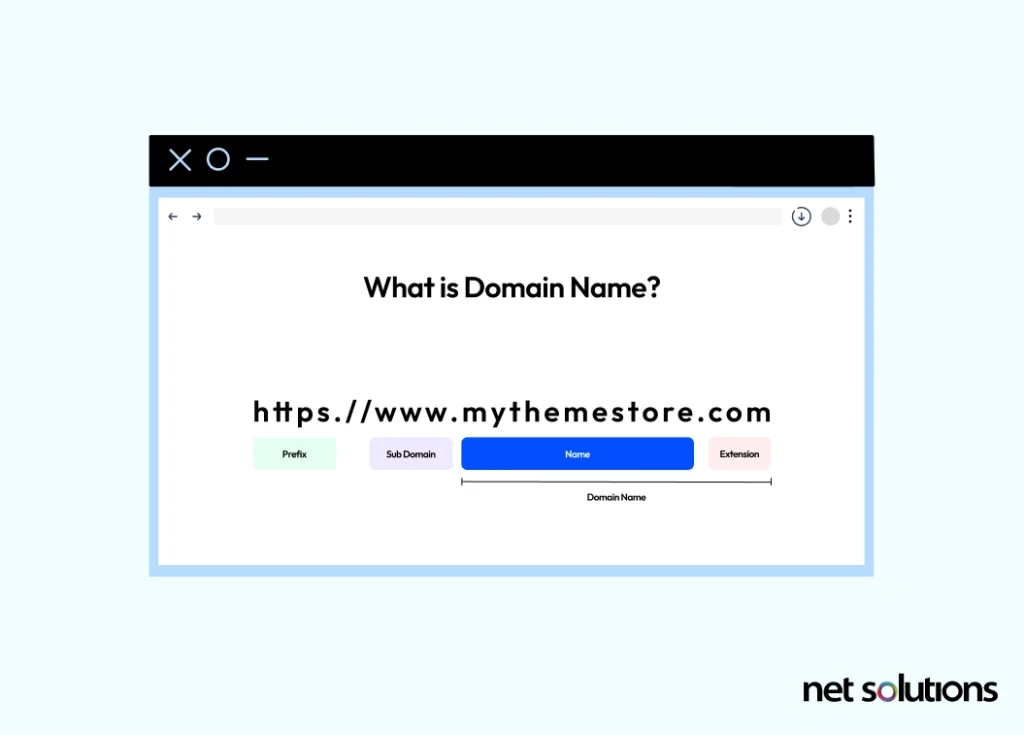
4. Themes or Custom Designs
BigCommerce includes the capability to customize a default storefront design using low-code/no-code tools, but you can additionally purchase more comprehensive themes from the BigCommerce marketplace. Most themes listed will have a one-time purchase cost. Further, you can choose instead to author a custom theme, incurring additional design and development costs.
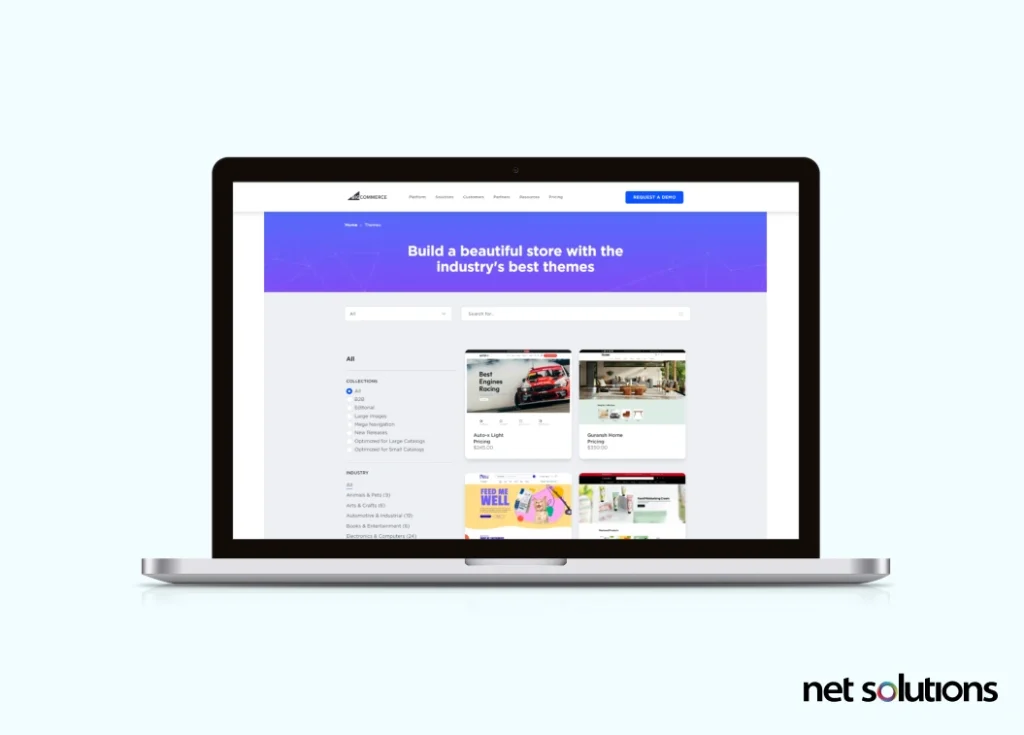
5. Apps and Integrations
You can browse the BigCommerce marketplace to add apps and integrations to your BigCommerce implementation, enhancing the back-end functionality or front-end experience. There are nearly 2000 apps and integrations listed in the app store, across AI, analytics, checkout, finance, marketing, merchandising, payments, security and more.
If you don’t know where to start on choosing the right apps to elevate your store’s performance, we have put together a list of 20 of our favorite BigCommerce apps.
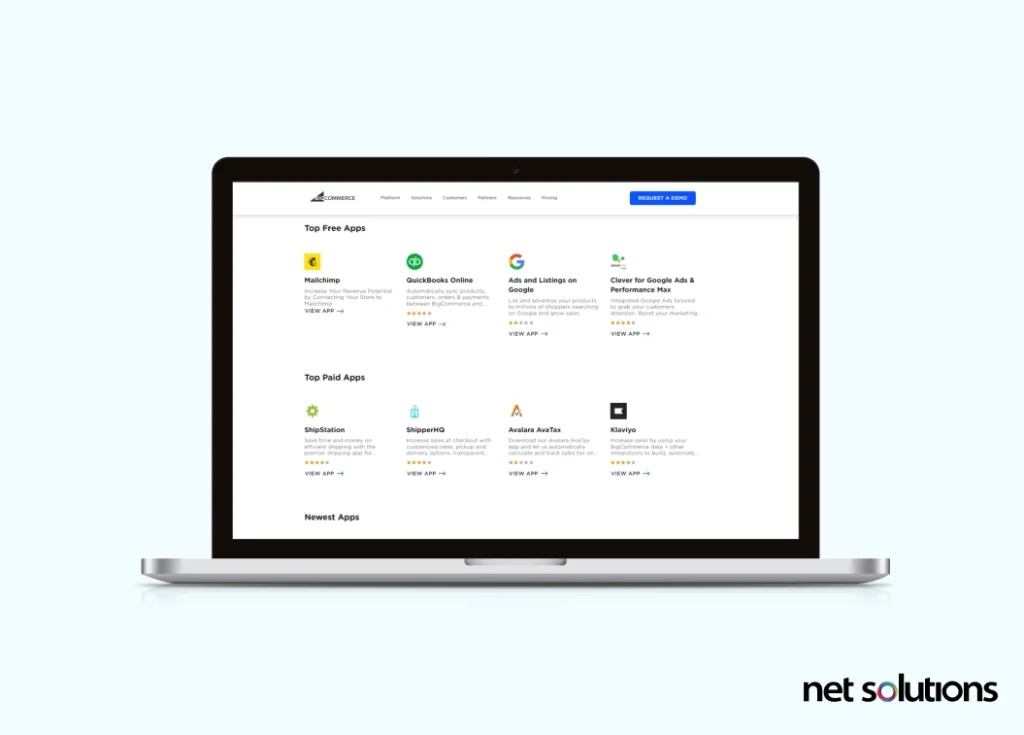
6. Payment Gateways
Although BigCommerce has no transaction fees across the board for all its plans, you can expect there to be third-party fees associated with payment gateways. BigCommerce builds in rates for credit cards via Paypal powered by Braintree, with prices decreasing per transaction as you go up in tiers, but you can also choose to integrate with additional payment gateways.
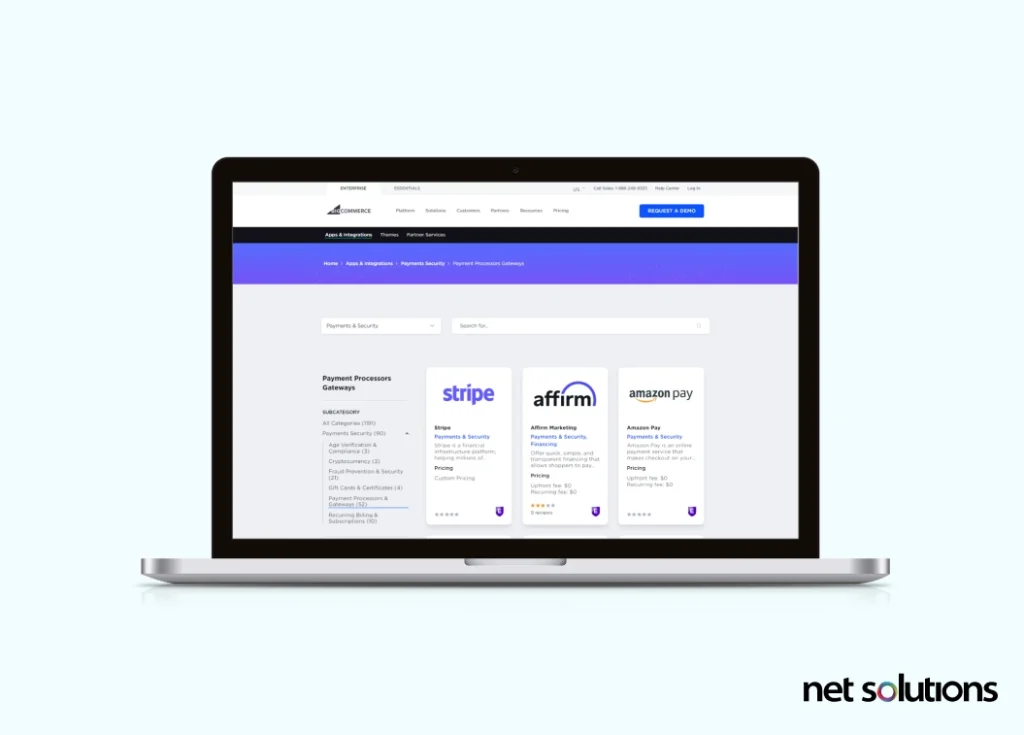
7. Front-End Development
BigCommerce can be deployed in a basic way, leveraging the front-end technologies and services available in the marketplace, using BigCommerce’s all-in-one frontend-as-a-service (FEaaS) to create a progressive web app, or you can leverage BigCommerce in a fully headless and composable way, creating your own bespoke tech stack and custom front-ends. In this case, you can incur additional development, hosting and maintenance costs.
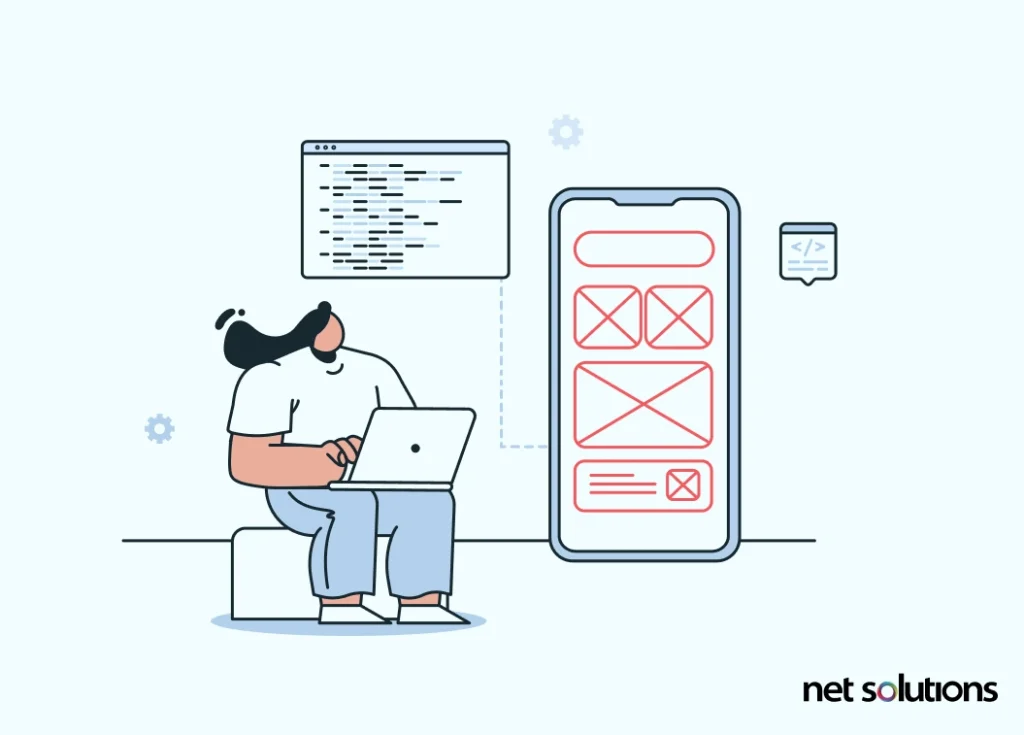
8. POS Solutions
If you operate a brick-and-mortar store, or operate in-person sales at trade shows or markets, you may need a point-of-sale (POS) solution to connect your in-person sales with BigCommerce or to support buy online, pickup in store (BOPIS) sales.
BigCommerce never charges transaction fees for sales, including those on POS, but does not have a proprietary POS system. BigCommerce offers integrations with PayPal Zettle, Square, Clover, ConnectPOS, Vend and others. Some of these POS providers will charge a fee, both upfront or recurring.
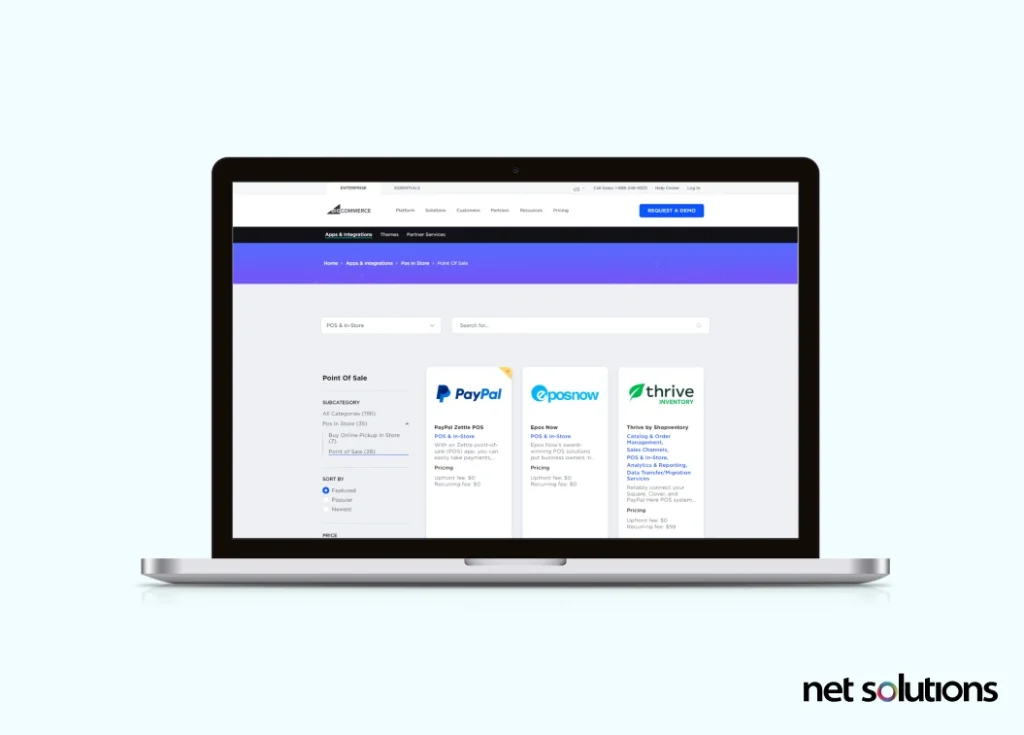
How Can You Choose the Right BigCommerce Plan?
While there are only a limited number of price plans for BigCommerce, you may still have trouble estimating which price plan is right for you. Since BigCommerce price plans automatically shift based on sales volume, it is critical for your budgeting to have an idea where you stand. To do this, we suggest you:
- Estimate your monthly and annual sales volume
- Look if there are any months where your sales volume is unusually high (e.g. sales), which may impact a price tier increase
- Consider if the price plan that matches your sales volume has the features you require
- Consult with an experienced BigCommerce partner, who can advise you on how to optimize your store
The next step that may help is comparing BigCommerce pricing with that of other eCommerce platforms, which follows.
How Does BigCommerce Pricing Compare with Other Platforms?
If price is the primary driver in your eCommerce platform decision, there are many variables that can impact your final monthly or annual cost. In this section, we’ll break down the costs of some of the more popular platforms for small to large enterprises—Shopify, Magento, WooCommerce, commercetools—to help you better understand how BigCommerce pricing stacks against its competition.
BigCommerce pricing vs Shopify pricing
Shopify is a simple eCommerce platform, providing an out-of-the-box experience to launch a storefront, but with fewer customizations as a result. Shopify and BigCommerce both operate with price tiers at comparable starting levels of $39 when paid monthly for BigCommerce Standard ($29 per month when paid annually) or $38 when paid monthly for Shopify Basic ($28 per month when paid annually).
The highest tier pricing is non-transparent for BigCommerce, estimated at $1000 per month, but for Shopify starts at $2400 per month for the Plus plan. To learn more, read our in-depth comparison of BigCommerce vs Shopify.
BigCommerce pricing vs Magento and Adobe Commerce pricing
Magento is owned by Adobe, available both as a free plan as Magento Open Source for B2C digital storefronts or as a licensed product for enterprise B2B and B2C brands, either Adobe Commerce on Premise, or hosted on Cloud as Adobe Commerce Pro or Adobe Commerce Managed Services, all at custom prices.
Adobe Commerce pricing is tiered based on Gross Merchandise Value (GMV) and Average Order Value (AOV), with pricing generally starting from $24,000 per year, while BigCommerce calculates is pricing tiers based on sales volume, with Standard, Plus, Pro and Enterprise plans starting at $39 when paid monthly for Standard or $348 annually ($29 per month). Read more in our in-depth comparison of BigCommerce vs Magento.
BigCommerce pricing vs WooCommerce pricing
WooCommerce is an open-source plugin for the open-source WordPress content management system (CMS), both of which are free to download and use. However, Woo Enterprise plans are available to add service to high-volume stores, and there are existing bundles of hosting plus WooCommerce that mimic the features of SaaS software such as BigCommerce.
Despite the initial free price tag, WooCommerce customers can expect to incur the cost to develop, host and customize the platform and potentially leverage Woo Enterprise, with estimates suggesting costs start at $5000 per month, while these costs are bundled into BigCommerce with prices starting at $39 when paid monthly for Standard or $348 annually ($29 per month). Read more in our in-depth comparison of WooCommerce vs BigCommerce.
BigCommerce pricing vs commercetools pricing
commercetools supports B2C, B2B and D2C businesses, available as a composable commerce solution or with a pre-composed solution and front-end, with non-transparent pricing tiers based upon annual income (skewed to larger organizations).
In comparison, BigCommerce offers a variety of pricing tiers for small to large enterprises, with transparent tier jumps based upon sales volume and starting at $39 when paid monthly for Standard or $348 annually. For further details, continue comparing commercetools vs BigCommerce.
Deliver exceptional experiences at scale with BigCommerce + Net Solutions
BigCommerce is one of the world’s top choices in eCommerce, providing exceptional flexibility with user-friendly tools. With over two decades of experience building eCommerce solutions, and with BigCommerce-certified developers, Net Solutions has the experience to launch high-performance, secure, revenue-driving online experiences in record time.
By partnering with Net Solutions to build and manage your BigCommerce implementation, you benefit from an inclusive solution, pairing great tech with exceptional service—for updates, security, SEO, channel development, customizations, design and experience support. Learn more about our BigCommerce development services or reach out for your no-obligation consultation.


